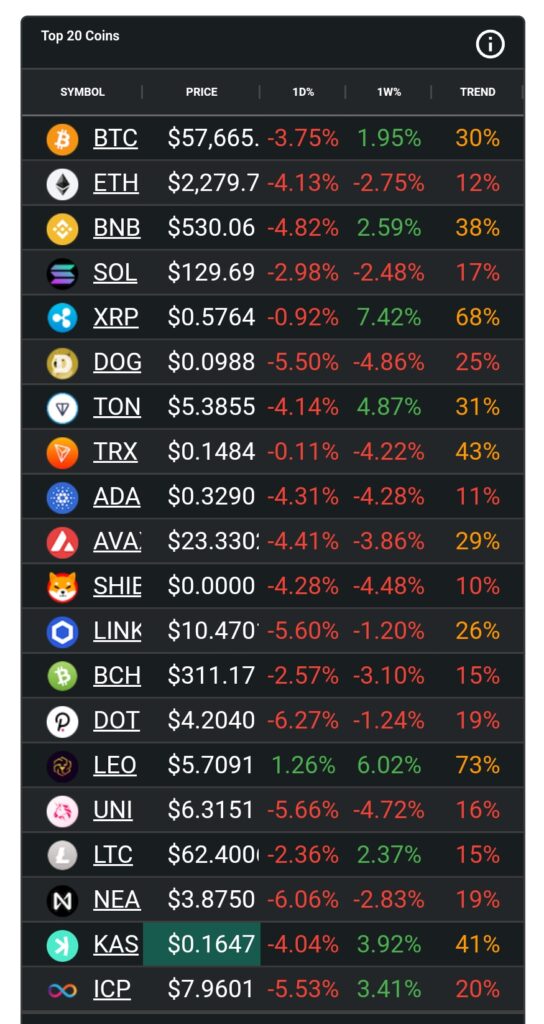The Morgan Stanley Bitcoin ETF marks a pivotal moment in the intersection of digital assets and mainstream finance. With Bitcoin ETFs, Morgan Stanley is enabling its wealthiest clients to access a regulated investment vehicle for Bitcoin.
If you’re curious about this development, here’s a quick rundown:
- Two Bitcoin ETFs: Morgan Stanley is offering BlackRock’s iShares Bitcoin Trust and Fidelity’s Wise Origin Bitcoin Fund to eligible clients.
- Client Requirements: To invest, clients need a net worth of at least $1.5 million and an aggressive risk tolerance.
- Advisory Role: Unlike other major Wall Street banks, Morgan Stanley advisors can actively pitch these ETFs to clients.
Bitcoin ETFs represent an easier, cheaper, and more regulated option for investing in Bitcoin. By taking this step, Morgan Stanley is catering to client demand while carefully managing risk.
As john creek, with years of experience in cryptocurrency markets and a keen focus on how financial institutions integrate digital assets, I’ll guide you through the details and implications of Morgan Stanley’s move.
Here’s an infographic to clarify the basics:

Understanding Bitcoin ETFs
What Are Bitcoin ETFs?
Bitcoin ETFs, or exchange-traded funds, are investment vehicles that track the price of Bitcoin. There are two main types: Bitcoin futures ETFs and spot Bitcoin ETFs.
Bitcoin futures ETFs hold Bitcoin futures contracts, which are agreements to buy or sell Bitcoin at a future date for a set price. These ETFs don’t hold actual Bitcoin but provide exposure to its price movements through futures contracts traded on the Chicago Mercantile Exchange (CME).
Spot Bitcoin ETFs, on the other hand, hold actual Bitcoin. This means they directly track the price of Bitcoin by holding the cryptocurrency in secure custody. These ETFs offer a more direct way to invest in Bitcoin without needing to manage the complexities of owning and storing the cryptocurrency yourself.
The U.S. Securities and Exchange Commission (SEC) approved the first spot Bitcoin ETFs for trading in January, marking a significant milestone for the crypto industry.
Benefits of Bitcoin ETFs
Bitcoin ETFs offer several advantages over direct ownership of Bitcoin:
-
Easier Access: Investors can buy and sell Bitcoin ETFs just like any other stock through their brokerage accounts. This simplifies the process, making it accessible even for those unfamiliar with cryptocurrency exchanges.
-
Cheaper Ownership: Bitcoin ETFs often come with lower costs compared to buying Bitcoin directly. This includes avoiding fees associated with cryptocurrency exchanges and the need for secure storage solutions.
-
Readily Traded: Bitcoin ETFs can be traded during regular market hours, providing liquidity and flexibility. This is unlike direct Bitcoin trading, which can be subject to market hours of specific exchanges.
By offering a regulated and straightforward way to invest in Bitcoin, these ETFs are attracting significant investor interest. As noted in the research, BlackRock’s iShares Bitcoin Trust (IBIT) and Fidelity’s Wise Origin Bitcoin Fund (FBTC) have been particularly popular, amassing billions in assets under management.
Morgan Stanley’s move to actively market these spot Bitcoin ETFs to eligible clients is a testament to the growing acceptance and demand for digital assets in traditional finance.
Morgan Stanley’s Entry into Bitcoin ETFs
Why Morgan Stanley’s Move Matters
Morgan Stanley allowing its financial advisors to market spot Bitcoin ETFs is a significant milestone for the finance industry. Traditionally, major banks have been cautious about cryptocurrency. However, Morgan Stanley’s decision to actively pitch Bitcoin ETFs like BlackRock’s iShares Bitcoin Trust (IBIT) and Fidelity’s Wise Origin Bitcoin Fund (FBTC) signals a shift.
Eric Balchunas, a senior ETF analyst for Bloomberg, called this a “major deal.” He highlighted that Morgan Stanley manages nearly $5.7 trillion in client assets. This move could increase the adoption of Bitcoin ETFs, given the bank’s vast client base.
This change also reflects the evolving marketplace. There’s growing client demand for digital assets. High-net-worth individuals want diversified portfolios that include cryptocurrencies. By offering Bitcoin ETFs, Morgan Stanley is meeting this demand while staying within a regulated framework.
Moreover, this move could set a precedent for other large banks. Currently, firms like Goldman Sachs and JPMorgan only offer Bitcoin ETFs if clients ask. Morgan Stanley’s proactive approach might push these banks to follow suit.
Eligibility and Investment Criteria
Morgan Stanley isn’t offering these Bitcoin ETFs to everyone. The bank has set strict eligibility criteria to manage risks effectively.
To qualify, clients must have:
- A net worth of at least $1.5 million.
- A high-risk tolerance.
- An interest in speculative investments.
These criteria ensure that only those who can handle Bitcoin’s volatility are involved. The bank is focusing on clients with substantial net worth and a high-risk profile. This strategy minimizes potential risks associated with the highly volatile nature of cryptocurrency markets.
Additionally, Morgan Stanley is limiting these investments to taxable accounts. This allows for closer monitoring of clients’ crypto exposure and ensures adherence to regulatory standards. By doing so, the bank aims to balance client interest with a risk-managed investment strategy.
This cautious yet forward-thinking approach highlights Morgan Stanley’s commitment to accommodating client interests while managing risks. The bank’s move to offer Bitcoin ETFs through its advisors is a strategic step towards embracing the growing crypto market.
Market Impact and Future Prospects
Current Market Trends
The introduction of Morgan Stanley Bitcoin ETFs has sparked significant interest. The Bitcoin price has seen substantial fluctuations, often driven by market sentiment and significant financial moves. For instance, the Grayscale Bitcoin Trust (GBTC) has experienced massive outflows, while newer spot bitcoin ETFs have amassed over $17.7 billion in net inflows.
BlackRock’s iShares Bitcoin Trust and Fidelity’s Wise Origin Bitcoin Fund are leading the charge, with $20 billion and nearly $10 billion of investor money flowing in, respectively. This shift indicates a growing preference for these new investment vehicles over older trusts like GBTC.
The launch of these ETFs has also influenced Bitcoin’s price. As more institutional money flows into these ETFs, the price of Bitcoin has shown a tendency to rise, reflecting increased adoption and confidence in the asset.
Future of Digital Asset Investments
Looking ahead, the market for digital asset investments is ready for further growth. The successful introduction of spot bitcoin ETFs sets a precedent for other digital assets. Recently, spot ether ETFs have become available for trading at brokerages like Fidelity and Schwab. Although Morgan Stanley is currently offering these on an unsolicited basis, there’s potential for future active promotion.
Regulatory Landscape: The regulatory environment will play a crucial role in shaping the future of digital asset investments. As more financial institutions enter the space, clear and supportive regulations will be essential to ensure market stability and investor protection.
Potential Market Developments: The approval of additional digital asset ETFs, such as those for ether, could further drive mainstream adoption. These products provide easier access and lower barriers for investors, potentially leading to increased inflows and market growth.
Mainstream Adoption: Morgan Stanley’s move to offer Bitcoin ETFs through its advisors is a significant step towards mainstream adoption of digital assets. With the backing of a major financial institution, other banks like Goldman Sachs, JPMorgan, and Wells Fargo may soon follow suit, expanding the reach and acceptance of cryptocurrency investments.
Bitcoin Price Fluctuations: The price of Bitcoin is likely to continue experiencing volatility, influenced by factors such as market sentiment, regulatory changes, and technological advancements. However, the growing institutional interest and the introduction of new investment products could help stabilize and support long-term price growth.
In summary, the market for digital asset investments is evolving rapidly. The introduction of Bitcoin and ether ETFs, combined with growing institutional interest and supportive regulations, suggests a promising future for these assets. As the landscape continues to develop, investors will need to stay informed and adapt to the changing dynamics of the market.
Conclusion
At CoinBuzzFeed, we strive to keep our readers updated on the latest trends and developments in the cryptocurrency market. The introduction of Morgan Stanley Bitcoin ETFs is a significant milestone in the adoption of digital assets by traditional finance. This move not only highlights the growing interest in cryptocurrencies but also opens new avenues for investors looking to diversify their portfolios.
Making informed decisions is crucial in the changing world of digital assets. With the availability of spot bitcoin ETFs through major financial institutions, investors now have easier access to these speculative investments. However, understand the risks and eligibility criteria before diving in.
For more detailed analysis and insights on Bitcoin prices and market trends, visit our Bitcoin Price Analysis: Current Trends and Outlook. Stay informed, stay ahead, and make the most of your cryptocurrency investments with CoinBuzzFeed.
By keeping an eye on market developments and leveraging the expertise of financial advisors, investors can steer the complex landscape of digital assets more effectively. As always, our goal is to provide you with the tools and knowledge needed to make sound investment decisions.



